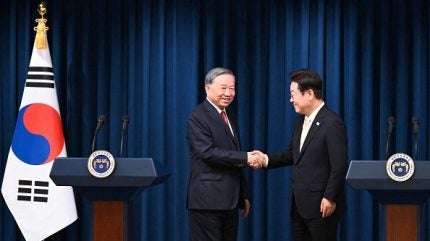
South Korea and Vietnam are strengthening trade ties as they face the implications of US tariffs on their export-dependent economies. Similarly, South Africa, Brazil and India have also expressed an intent to strengthen ties with non-US economic partners to dilute the impact of levies.
South Korean President Lee Jae Myung is hosting Vietnamese leader Lam Ta for a summit today (11 August). The President’s office said the leaders would sign ten memorandums of understanding outlining cooperation initiatives in various sectors including nuclear and renewable energy, monetary and financial policies, and science and technology.

Discover B2B Marketing That Performs
Combine business intelligence and editorial excellence to reach engaged professionals across 36 leading media platforms.
While Vietnam has long served as an export hub for South Korean businesses, official data suggests investments have stalled amid an uncertain tariff and economic landscape. Now, South Korean businesses are being considered as potential investors in major infrastructure projects in Vietnam, such as nuclear energy, liquefied natural gas plants and high-speed rail.
While both countries managed to secure a trade deal with the US, they are still left with higher tariffs than they were facing before. Vietnam’s tariff rate is 20%, whereas South Korea’s is 15%.
Brazil and India, both of which are also facing higher tariffs, have also expressed an intent to deepen economic ties. Brazilian President Luiz Inacio Lula da Silva and Indian Prime Minister Narendra Modi spoke about US tariffs by phone at the end of last week, according to both of their offices.
The leaders restated their previously outlined goal of growing bilateral trade between Brazil and India, which stood at $12bn last year, to $20bn by 2030. Additionally, Lula said the trade agreement between India and the Mercosur South American trade bloc could be expanded through, for example, virtual payment platforms.

US Tariffs are shifting - will you react or anticipate?
Don’t let policy changes catch you off guard. Stay proactive with real-time data and expert analysis.
By GlobalDataSouth African leaders have also signalled a greater focus on regional partners, as skirmishes with Washington over tariffs and US President Donald Trump’s unfounded claims of a genocide against white South Africans have frayed its relationship with the US.
“In the coming months, we will be scaling up our trade missions into new markets in Africa and beyond,” South African President Cyril Ramaphosa said in his newsletter last week. He said his government would develop a National Export Development Programme as part of these efforts, to “grow the pool of export-ready companies”.
After a whirlwind few months of threats, takebacks and only a few semi-baked trade deals, Trump’s universal tariffs for US imports took effect on 7 August. Since the wide-ranging tariffs were announced in April, economists and analysts have warned that they will have an inflationary effect, which will be particularly felt by US consumers.
As trade negotiations drag on, Washington is increasingly asking for political as well as economic concessions as a precondition for reaching a deal. The tariffs imposed on Brazil (which experts have highlighted will have a limited impact because of wide-ranging exemptions) were partly driven by Trump’s disapproval of the court case against ex-Brazilian leader Jair Bolsonaro for allegedly plotting a coup. He also doubled the 25% levies on Indian exports because of its Russian oil purchases.





